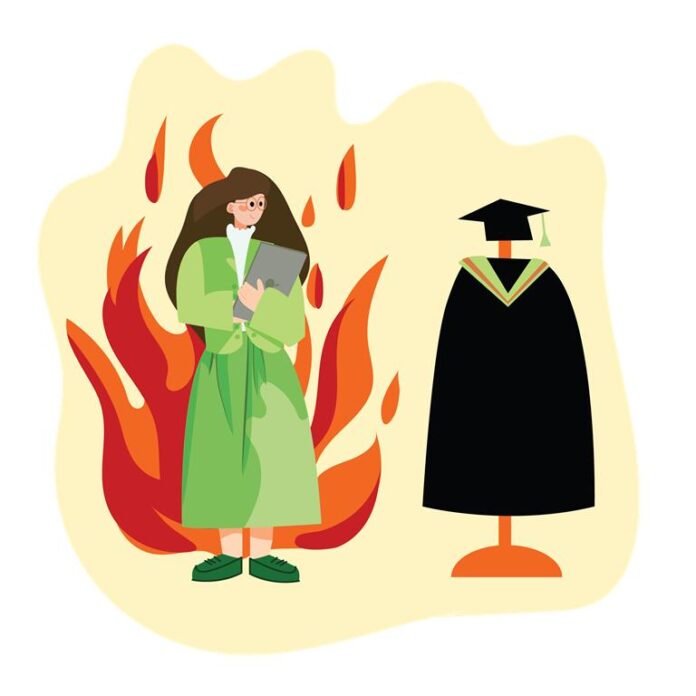Any graduates in the house? Going into your final year? Maybe even your final semester? Well, I am right there with you — and I am scared. I secretly hope you are too. A horrible confession, I know, but I seek comfort in the connection graduation stress can provide. Not a positive means of developing commonalities, but a reality of this academic life, nonetheless.
I, for one, am nervous. I have been very confident, passionate, and driven within my studies for a very long time — which I am fortunate to be able to say — but the career questioning has officially set in full force. I knew what I wanted to do with my degree after one semester of university and I was proud to admit it. Being confident in your future career path is a privilege, so I have felt lucky flowing through my UFV experience really knowing what I was moving toward. Then the Winter 2024 semester hit. I was met with inklings of discomfort toward my imagined future. I started asking myself if this is really what I want to do, and stress grew as uncertainty took over.
Academic burnout topped with anticipated career burnout creates a vicious concoction, but it is crucial to be aware of. This study of 351 undergraduate students explores whether career burnout and engagement was an issue among these surveyors. It was found that, regardless of their future profession, the vast majority of students anticipated career burnout within 10 years of working in their field. Although burnout is already familiar to undergraduate students in an academic sense, the anticipatory career burnout is not something to be taken lightly. Satisfaction lowers, motivation becomes harder to come by, and there is less engagement in learning. Personally, this anticipatory burnout causes a high level of stress — which, as this study solidified — I am not alone in. The future is unknown, and I think this anxious anticipation is a very human emotion, but that doesn’t make it feel any less significant.
I think a lot of this stress comes from a self-perception within academia. Self-esteem becomes a significant motivator for university students when it comes to achievement versus exhaustion. The Learning and Individual Differences research journal discovered that “social support can help to enhance students’ self-esteem and thus help them obtain better academic achievement and protect them from emotional exhaustion.” Ultimately, supportive environments truly do change the outcome of your personal and academic life. This does not come without effort. Trust me, your headspace and your surroundings really influence everything; academics and career life are not exceptions.
During this huge transition period from student to professional, be kind to yourself. Believe in your capabilities. Ask for help — from friends, family, peers, or even UFV! There may not be a solution to anticipated career burnout or academic exhaustion, but that does not mean we should pretend it is not a part of our reality. Start the conversation, create connections. Although education fatigue and career questioning are a mighty force, the awareness of them provides you with the upper hand over your agency.
Author Kurt Vonnegut, my personal hero, presented many commencement speeches and addresses over the course of his life. Enough to fill a book — literally, I own it. If This Isn’t Nice, What Is? is a compilation of graduation speeches and “other words to live by.” I have recently found myself with my nose stuck in the pages of these speeches. I guess I am longing for comfort and reassurance as graduation sneaks up on me. Vonnegut says, “We have to continually be jumping off cliffs and developing our wings on the way down.” Sappy I know, but Kurt really gets it. Happy graduation to those who will be celebrating. See you at commencement.


